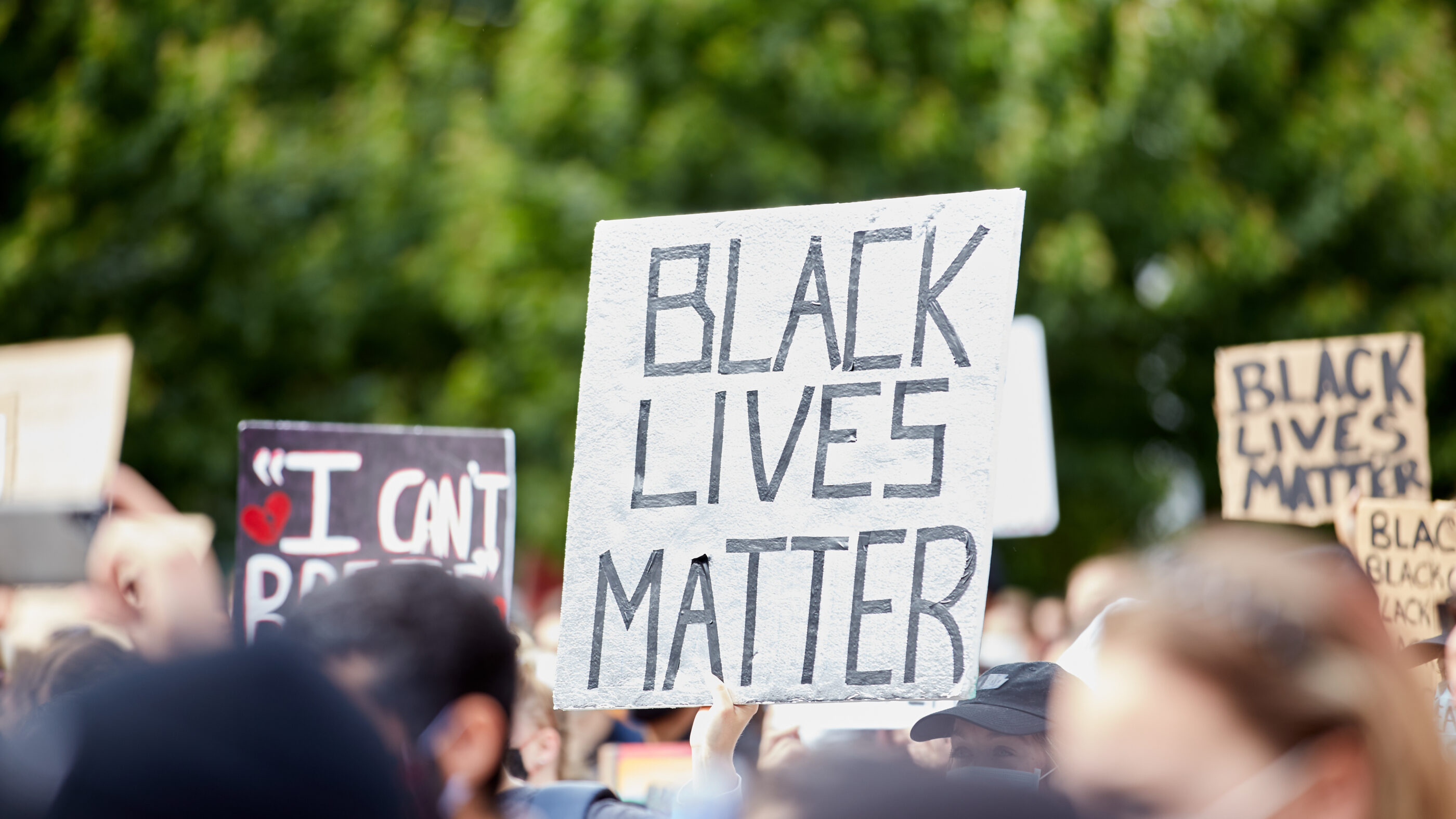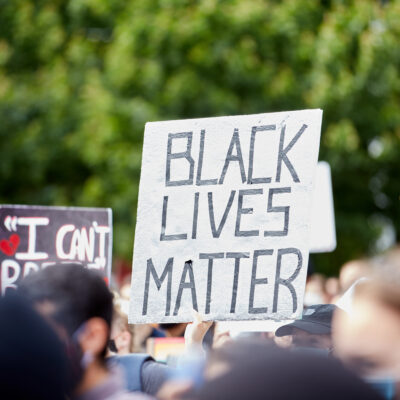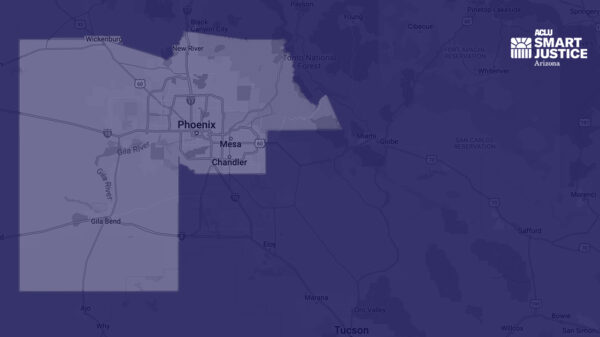For years, advocates and organizations on the ground have been speaking out against the lies and violence done at the hands of local law enforcement. The Phoenix Police Department abusing their authority is nothing new, but why has the DOJ decided to get involved now?
When the Department of Justice announced its investigation of the Phoenix Police Department (PPD), the response was overwhelming—what took them so long? For years, advocates and organizations on the ground have been speaking out against the lies and violence done at the hands of local law enforcement. PPD abusing their authority is nothing new, but why has the DOJ decided to get involved now?
The misconduct and countless lawsuits filed against PPD and MCAO, including by the ACLU of Arizona, are important to keep in mind as you read the news about various investigations and reports on these agencies. A few weeks ago, Ballard Spahr, LLP, hired by the Phoenix City Manager to investigate PPD’s treatment of protestors, released two reports: one on a “challenge coin” containing hate speech that mocked the injury of a protestor in August 2017, and one on the baseless gang charges brought against Black Lives Matter protestors arrested in October 2020. These two reports were immediately followed by MCAO’s abrupt release of a report from its external review by retired judge Roland Steinle.
Let’s take a step back to break down these investigations and what they mean moving forward.
The Ballard Spahr Reports on the Phoenix Police Department
Ballard Spahr Report on the Challenge Coin
The existence of the challenge coin was revealed as part of a class action lawsuit brought by the ACLU of Arizona on behalf of Puente Human Rights Movement, Poder in Action, and multiple individuals against PPD for unconstitutionally attacking thousands of peaceful protestors without warning at an August 2017 protest. One of the things people were protesting was President Trump’s decision to pardon former Sherriff Joe Arpaio for criminal contempt of court. He was found in contempt after the court ordered him to stop illegally racially-profiling Arizonans in another ACLU of Arizona class-action lawsuit.
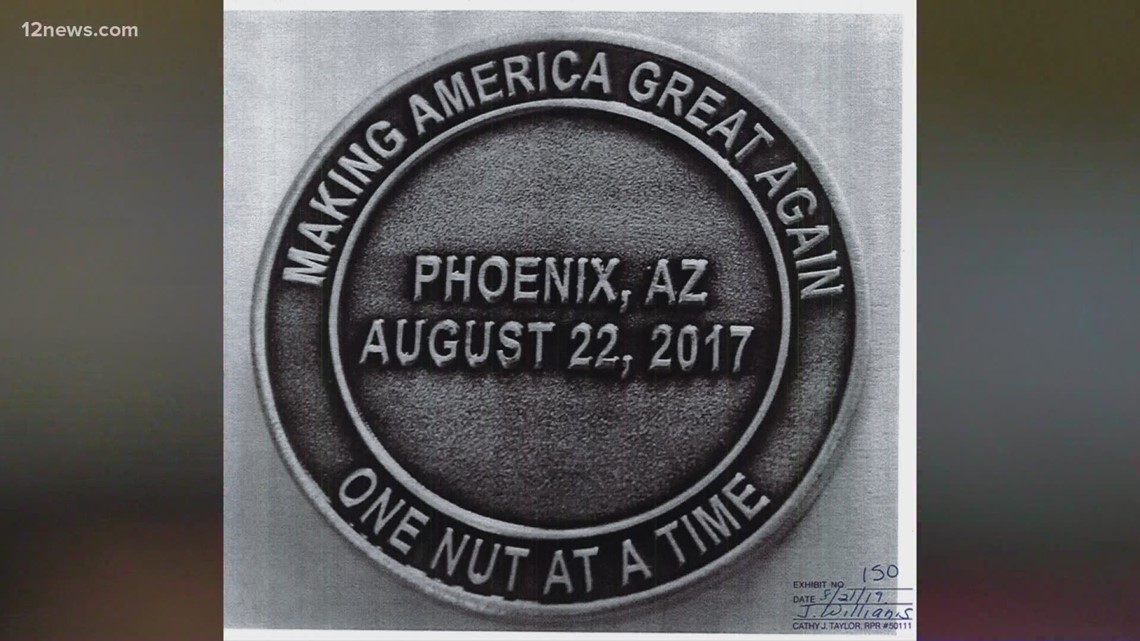
One protestor was shot in the groin with a pepper ball and it’s this action that the challenge coin “commemorates.” According to the Ballard Spahr report, six of the officers named in our protest lawsuit had a coin (or a patch with the same image). While Ballard Spahr did not find that the officers knew of the coin’s connection to hate speech, they were also unable to conduct a full investigation because many officers refused to cooperate. Officers refused to speak to them, citing special legal and contractual protections that other city employees do not receive, which help shield them from discipline and accountability.
In response to the Ballard Spahr report, the City Manager called on Police Chief Jeri Williams to write or strengthen policies “prohibiting hate speech” by officers. It is frankly shocking that officers whose job it is to serve and protect the community have to be told not to engage in hate speech.
A separate external review team has been contracted by PPD/City to recommend “appropriate reforms” to the PPD units that are deployed when there are protests. PPD has previously failed to follow its own recommendations on the use of crowd control weapons, however we are hopeful that they will seriously consider the reforms recommended by this external team. If not, our ongoing lawsuit will ask the court to force them to change their policies and practices.
Ballard Spar Report on the Political Prosecutions
As has been extensively reported, PPD and MCAO officials conspired to lie to the grand jury and invent a fictitious gang, allegedly called ACAB, in order to unlawfully prosecute protestors. ACAB, or “all cops are bastards,” is “widely recognized as a slogan – not an organized group or gang,” the Ballard Spahr report confirmed. PPD invented this “gang” after tracking individuals involved in the Black Lives Matter movement who were organizing protests critical of the police department, all while ignoring ample evidence that the organizers had no intention of advocating for violence. Another investigation conducted by Judge Steinle found that “there can be no argument the Phoenix Police Department was attempting stop the marches based upon the content” of the protestors’ expression. When the government attempts to shut down a protest because officials don’t agree with the protestors’ views, that is the clearest possible violation of the First Amendment. Unfortunately, targeting and misrepresenting protest movements and individual activists is not new; it was a frequent tactic of police departments during the Civil Rights era.
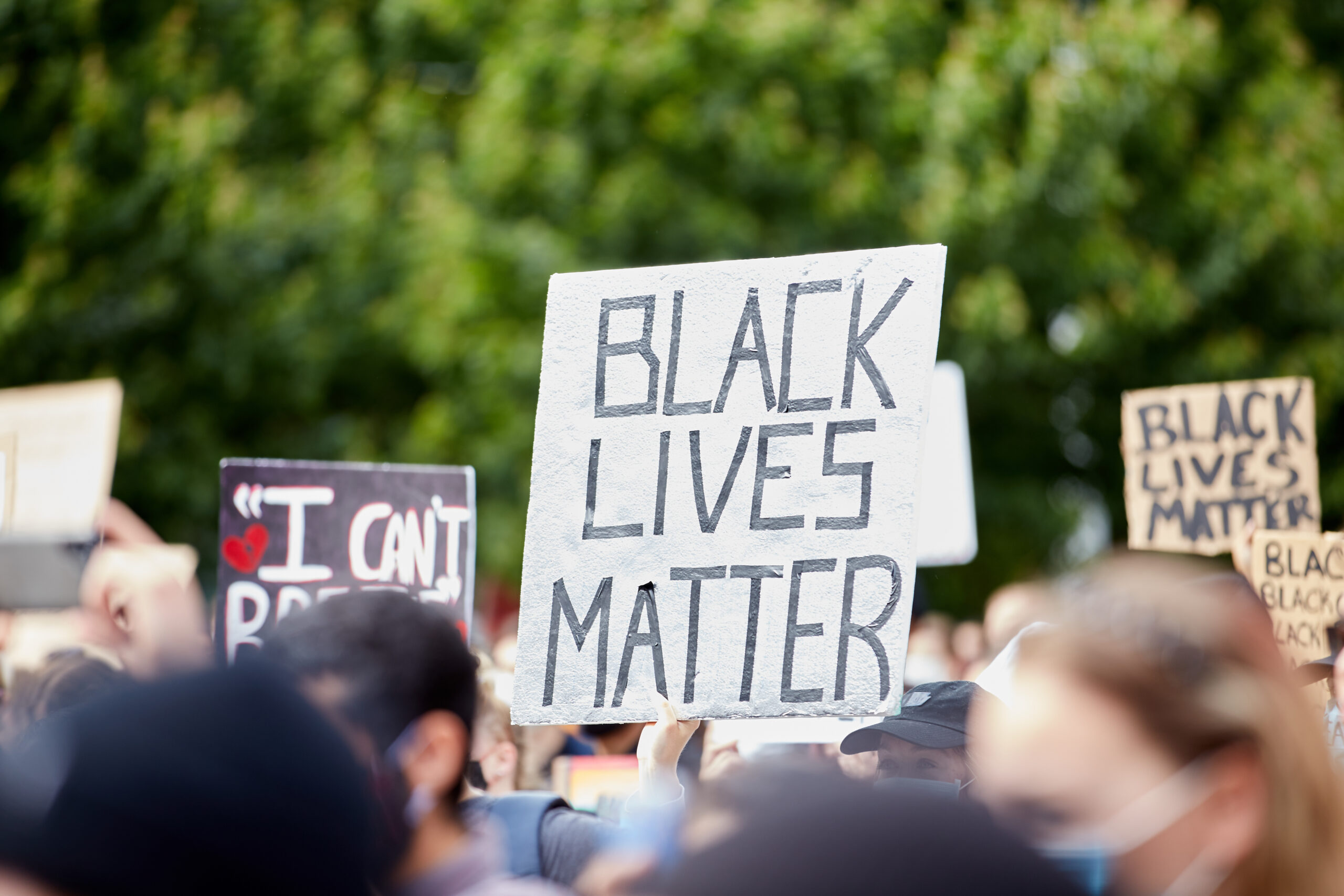
The judge who dismissed the gang charges against the protestors called one of the involved officer’s grand jury testimony “clearly false, misleading, and inflammatory.” That officer has now been placed on MCAO’s “Brady list,” meaning defense counsel must be told that there are potential concerns with the integrity of his testimony in every case he is involved in. However, officers on this list are rarely, if ever, fired, despite their documented lies and betrayal of the public trust.
Beyond the egregious conduct of individual officers (some of whom also attacked peaceful protestors in 2017), the Ballard Spahr report shows how proper police procedures were not followed in the investigation and demonstrates a failure of supervision. The PPD’s Gang Enforcement Unit, which is supposed to be involved in all gang cases, was deliberately left out of the loop. After finding out about the ACAB gang charges, the Gang Unit’s commander declined to be involved as he did not want to damage his unit’s credibility — yet he failed to bring his concerns to Phoenix Police Chief Jeri Williams or otherwise take action to stop the pursuit of the improper charges.
As a result of the Ballard Spahr report, Chief Williams, who did not know about the charges, was suspended for a day. Several officers were demoted, and one was referred to the Attorney General for criminal prosecution. These measures, while welcome, are insufficient to rebuild the community trust destroyed by the police officers who lied to the grand jury and those who allowed these lies to go uncorrected. Using false criminal charges to silence dissent is the action of a totalitarian regime, and an egregious violation of our basic Constitutional principles.
The Steinle Report on the Maricopa County Attorneys’ Office’s Political Prosecutions
Just hours after the Ballard Spahr report was released, MCAO released a report of an internal investigation by retired Judge Roland Steinle into the agency’s role in the political prosecutions. The Steinle report explains how “[b]oth Sgt. McBride and [MCAO prosecutor] Ms. Sponsel colluded in their efforts to present the Grand Jury with false information regarding a non-existent gang and a historical pattern of misconduct or threats from co-defendants towards the police.”
The idea for the gang charges originated with a MCAO supervisor, Vince Goddard (since resigned), and was enthusiastically embraced by April Sponsel, the prosecutor in MCAO’s First Responders’ Bureau. The First Responders’ Bureau focuses on cases in which police and other first responders are victims. Importantly, MCAO has no comparable unit to investigate crimes perpetrated by police. The Steinle report found that the First Responders’ Bureau is problematic because its “affinity” with police “creates the predilection by the prosecutors to accept the Phoenix police narrative without any review.” That is exactly why we, along with other organizations, publicly called for the bureau to be disbanded in our letter to County Attorney Allister Adel on April 1, 2021 (Adel dismissed our concerns and called them “absurd”).
The Steinle report places plenty of blame on Ms. Sponsel, whom the report finds committed several ethical violations and failed to do even “minimal vetting” of some of the charges. However, the reports fall short on calling for accountability for her supervisors. Ken Vick, one of the highest-ranking attorneys in the office, knew about the bogus gang charges and recognized them as problematic at least as far back as October 2020. Yet nothing was done until after the media began reporting on the prosecutions in February 2021. Now that a judge has finally dismissed all of the bogus charges, multiple protestors whose charges were dismissed have taken steps toward filing civil claims against MCAO and other officials for the harm they suffered – and the cost of litigating those cases will be borne by the taxpayers.
In addition to the political gang charges, the Steinle report touches on the use of felony riot charges against protestors. Adel knew that Sponsel had charged a protestor with felony rioting—likely the first time this had been done in Arizona—and she did nothing to examine the appropriateness of those charges. Given the egregious abuses of authority that occurred here, the last thing that we need is to give police and prosecutors more tools to use against protestors. Yet in the 2021 session, lawmakers tried to do just that by considering HB 2309, which would have made it a felony to be in a group of six or more people where a person is injured or property is damaged. We worked with allies to help to defeat this bill, and will continue to fight for free speech in 2022.
MCAO Prosecutors have a Longstanding Pattern and Practice of Ignoring Ethical and Constitutional Limits on their Conduct
While the Steinle report confines itself to a particular set of prosecutions, misconduct by MCAO and PPD is not limited to these few cases—as evidenced by our lawsuits against these departments. Unfortunately, it is part of a pattern and practice of unethical and unconstitutional behavior intended to secure convictions at any cost. For instance, in October 2020, another person came forward and filed a lawsuit because the state failed to disclose important evidence in her 2016 case. As a result, she sat in jail for months for a crime she did not commit. A judge recently found that a MCAO prosecutor “picked and chose what fit their narrative to the exclusion of accurate facts,” and that as a result “[t]o be blunt, the Court has no trust in the State.” CR2020-101218-001 DT, Ruling (8/11/21).
A judge recently found that a MCAO prosecutor “picked and chose what fit their narrative to the exclusion of accurate facts,” and that as a result “[t]o be blunt, the Court has no trust in the State.”
Another judge recently dismissed a different case because, among other things, “the State obtained the indictment with perjured testimony” and “failed to disclose Brady impeachment evidence regarding its lead witness.” CR2017-001324-001 DT, Ruling (7/12/21). The Court could not “find an iota of appreciation for the seriousness of its misconduct in the [prosecutor’s] briefs,” which not only did “not further justice,” but also “ignore[d] the ethical obligations of candor and honesty to the Court.”
In addition to flagrant acts of misconduct by individual prosecutors, MCAO is utilizing the “Early Disposition Courts (EDC),” to coerce plea bargains by threatening to make future pleas harsher if the accused person does not waive important constitutional rights. This is a direct violation of prosecutors’ ethical duty to seek justice. We are currently challenging this policy in court. One of the problems with the EDC was recognized in Judge Steinle’s report, which recommended: “The MCAO Adel shall set forth a new policy: If Body Wear Camera [sic] evidence is present in a case, no charges will be filed until the charging attorney has had an opportunity to review the BWC videos. While it may be normal to trust reports submitted, now based upon the history of unreliable reports in this case, verification is necessary.” Adel’s letter, which accompanied the report, states that her office will “[d]evelop better guidance for MCAO staff on the handling, reviewing, and disclosing body-worn camera footage and the importance of that footage in charging decisions.” We call on Allister Adel to fully implement Judge Steinle’s recommendation that no charges be filed, in any case, until body worn camera footage is reviewed, and to promise to disclose such footage to defense counsel prior to forcing the defense to make a decision on any plea offer.
The ACLU of Arizona, along with many other individuals and organizations, has been drawing attention to MCAO’s ongoing and pervasive ethical violations and culture of impunity for years. The County Attorney must commit to addressing ethical violations by MCAO prosecutors every time they come to light, whether that is in a judicial opinion, in an investigative report, or in a civil lawsuit.
What's Next? Holding Police and Prosecutors Accountable
The DOJ’s investigation of the Phoenix Police Department’s will include use of force, retaliation against protestors, discriminatory policing, and treatment of individuals with disabilities and those experiencing homelessness.
Since the first recommendation of the Ballard Spahr report was to “[r]etain a separate law enforcement agency to conduct a thorough investigation,” the DOJ’s investigation is timely. However, it was clear at the community meeting that the DOJ recently held that many in the community do not trust the DOJ to do the right thing and are frustrated by the prospect of another lengthy investigation that tells those who live in the community what they already know. Given the complete failure of virtually every law enforcement agency with jurisdiction over Phoenix to actually protect public safety, skepticism of law enforcement is certainly understandable.
The Department of Justice should investigate the Phoenix Police Department. However, as is abundantly clear from reading the Ballad Spahr and Steinle reports, the Phoenix Police Department cannot be meaningfully investigated unless that investigation includes its co-conspirator, the Maricopa County Attorneys’ Office. As a result, many organizations on the ground have called upon the Department of Justice to expand its investigation to include the MCAO.
Regardless of what the DOJ does, however, we remain committed to using all the tools at our disposal, including lawsuits, pursuing legislative change, and working to support the efforts of impacted communities and organizations, to ensure that the criminal justice system protects the constitutional rights of all Arizonans.

